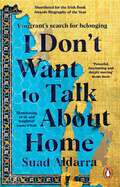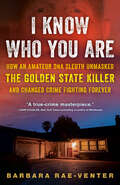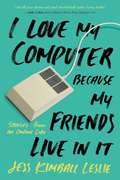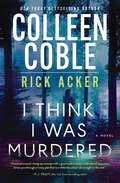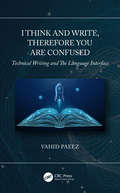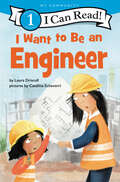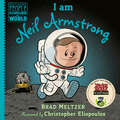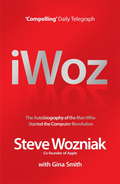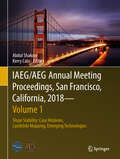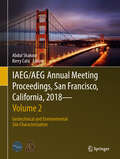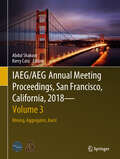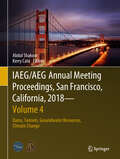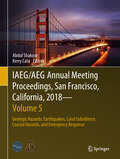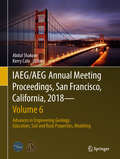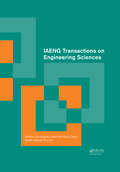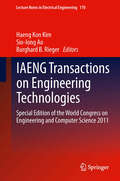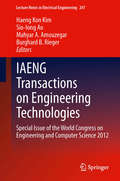- Table View
- List View
I Don't Want to Talk About Home: A migrant’s search for belonging
by Suad AldarraPowerful, fascinating and deeply moving - this book pushes aside our lazy images of human migration and refugees. I loved it. RODDY DOYLE, author of LoveTHE BESTSELLING MEMOIR - SHORTLISTED FOR THE IRISH NATIONAL BOOK AWARDS BIOGRAPHY OF THE YEAR'I carry my troubled homeland within me; I hide it like a crime.'Growing up in conservative Saudi Arabia, Suad Aldarra felt stifled by the strictures placed on women. She yearned for the vibrant Syrian streets of her family's origin. When the opportunity arose to study at Damascus University, she jumped at the chance to move to a city she loved and to experience a degree of freedom she'd never known.But when the war started, everything changed. Suddenly Suad was thrown into a world of relentless pressure desperately looking for a way out. Her degree in software engineering was the saving grace that allowed her to travel to Ireland on a working visa. Yet reaching safety came at a price ...I Don't Want to Talk About Home is not a memoir about war and destruction. It's not about camps or boats. It's about the enduring love for a home that ceased to exist, building a life out of the rubble, and the parts of yourself you lose and find when integrating into a new world.Illuminating, vivid, and insightful, this is such a timely book. LOUISE O'NEILL, author of IdolFull of heart, honesty and hard-learnt wisdom... a captivating journey across continents, history and culture. I literally couldn't put this book down.JAN CARSON author of The Raptures
I Is for Idea: An Inventions Alphabet
by Marcia Schonberg Kandy RadzinskiAn A to Z introduction to modern inventions such as computers, microwave, umbrella, zipper, and many more. Each invention is introduced with a poem and includes detailed-filled expository text.
I Know Who You Are and I Saw What You Did
by Lori AndrewsSocial networks are the defining cultural movement of our time, empowering us in constantly evolving ways. We can all now be reporters, alerting the world to breaking news of a natural disaster; we can participate in crowd-sourced scientific research; and we can become investigators, helping the police solve crimes. Social networks have even helped to bring down governments. But they have also greatly accelerated the erosion of our personal privacy rights, and any one of us could become the victim of shocking violations at any time. If Facebook were a country, it would be the third largest nation in the world; but while that nation appears to be a comforting small town, in which we socialize with our selective group of friends, it and the rest of the Web is actually a lawless frontier of hidden and unpredictable dangers. The same power of information that can topple governments can destroy a person's career or marriage. As leading expert on social networks and privacy Lori Andrews shows, through groundbreaking in-depth research and a host of stunning stories of abuses, as we work and chat and shop and date (and even sometimes have sex) over the Web, we are opening ourselves up to increasingly intrusive, relentless, and anonymous surveillance--by employers, schools, lawyers, the police, and aggressive data aggregator services that compile an astonishing amount of information about us and sell it to any and all takers. She reveals the myriad ever more sophisticated techniques being used to track us and discloses how routinely colleges and employers reject applicants due to personal information searches; robbers use postings about vacations to target homes for break-ins; lawyers readily find information to use against us in divorce and child custody cases; and at one school, the administrators actually used the cameras on students' school-provided laptops to spy on them in their homes. Some mobile Web devices are even being programmed to listen in on us and feed data services a steady stream of information about where we are and what we are doing. And even if we use the best services to get our personal data removed from the Web, in a short time almost all that data is restored. As Andrews persuasively argues, the legal system cannot be counted on to protect us--in the thousands of cases brought to trial by those whose rights have been violated, judges have most often ruled against them. That is why in addition to revealing the dangers and providing the best expert advice about protecting ourselves, Andrews proposes that we must all become supporters of a Constitution for the Web, which she has drafted and introduces in this book. Now is the time to join her and take action--the very future of privacy is at stake.
I Know Who You Are: How an Amateur DNA Sleuth Unmasked the Golden State Killer and Changed Crime Fighting Forever
by Barbara Rae-Venter&“A true-crime masterpiece written by a cold-case-cracking master. Barbara Rae-Venter&’s investigative DNA work has revolutionized the way law enforcement hunts serial killers.&”—John Douglas, New York Times bestselling co-author of Mindhunter &“Barbara Rae-Venter isn't just the genealogy expert who helped capture the Golden State Killer—she&’s an unsung hero who has given murdered women and children their faces and names back, the recognizing that their lives mattered.&”—Maureen Callahan, New York Times bestselling author of American Predator For twelve years the Golden State Killer terrorized California, stalking victims and killing without remorse. Then he simply disappeared, for the next forty-four years, until an amateur DNA sleuth opened her laptop. In I Know Who You Are, Barbara Rae-Venter reveals how she went from researching her family history as a retiree to hunting for a notorious serial killer—and how she became the nation&’s leading authority on investigative genetic genealogy, the most dazzling new crime-fighting weapon to appear in decades. Rae-Venter leads readers on a vivid journey through the many cases she tackled, often starting with little more than a DNA sample. From the first criminal case she ever solved—uncovering the long-lost identity of a child abductee—to the heartbreaking story of the Billboard Boy, whose skeletal remains were discovered along a highway, to the search for the Golden State Killer, Rae-Venter shares haunting, often thrilling accounts of how she helped solve some of America&’s most chilling cold cases in the span of just three years.For each investigation, Rae-Venter brings readers inside her unique &“grasshopper mind&” as she analyzes DNA data and pores through obituaries, marriage records, and old newspaper articles. Readers join in on urgent calls with sheriffs, FBI agents, and district attorneys as she details the struggle to obtain usable crime scene DNA samples, until, finally, a critical piece of the puzzle tumbles into place.I Know Who You Are captures both the exhilaration of the moment of discovery and the sheer depth of emotion that lingers around cold cases, informing Rae-Venter&’s careful approach to her work. It is a story of relentless curiosity, of constant invention and reinvention, and of human beings striving to answer the most elemental questions about themselves: What defines identity? Where do we belong? And are we truly who we think we are?
I LOVE Strawberries
by Shannon AndersonJolie LOVES strawberries - and she’s on an unstoppable (and hilarious) mission to grow her own food from seedling to table in this colorful introduction to the joy of growing the popular perennial.
I Love My Computer Because My Friends Live in It: Stories from an Online Life
by Jess Kimball LeslieI Love My Computer Because My Friends Live in It is tech analyst Jess Kimball Leslie's hilarious, frank homage to the technology that contributed so significantly to the person she is today. From accounts of the lawless chat rooms of early AOL to the perpetual high school reunions that are modern-day Facebook and Instagram, her essays paint a clear picture: That all of us have a much more twisted, meaningful, emotional relationship with the online world than we realize or let on. Coming of age in suburban Connecticut in the late '80s and early '90s, Jess looked to the nascent Internet to find the tribes she couldn't find IRL: fellow Bette Midler fans; women who seemed impossibly sure of their sexuality; people who worked with computers every day as part of their actual jobs without being ridiculed as nerds. It's in large part because of her embrace of an online life that Jess is where she is now, happily married, with a wife, son, and dog, and making a living of analyzing Internet trends and forecasting the future of tech. She bets most people would credit technology for many of their successes, too, if they could only shed the notion that it's as a mind-numbing drug on which we're all overdosing.
I Love You, Michael Collins
by Lauren Baratz-Logsted<p>It’s 1969 and the country is gearing up for what looks to be the most exciting moment in U.S. history: men landing on the moon. Ten-year-old Mamie’s class is given an assignment to write letters to the astronauts. All the girls write to Neil Armstrong ("So cute!") and all the boys write to Buzz Aldrin ("So cool!"). Only Mamie writes to Michael Collins, the astronaut who will come so close but never achieve everyone else's dream of walking on the moon, because he is the one who must stay out in space with the ship. <p>After school ends, Mamie keeps writing to Michael Collins, taking comfort in telling someone about what's going on with her family as, one by one, they leave the house thinking that someone else is taking care of her—until she is all alone except for her cat and her best friend, Buster. And as the date of the launch nears, Mamie can't help but wonder: Does no one stay with the ship anymore? <p>With I Love You, Michael Collins, Lauren Baratz-Logsted has created a heartwarming story about family and being true to yourself.</p>
I Think I Was Murdered
by Colleen Coble Rick Acker"It's a high-octane thriller with the grounding touches of Katrina's Norwegian heritage, the hygge of North Haven, and a very sweet romance between two likable, vulnerable people. Romantic suspense comfort food--just like waffles with cloudberry cream." --KIRKUSThis timely, high-concept novel delves into the impact of AI on a grieving widow who uses a chatbot to "talk" to her dead husband. What she never expects is the response when she asks it to tell her something she doesn't know: I think I was murdered. Reading a novel from bestselling authors Colleen Coble and Rick Acker feels akin to watching a BBC mystery series: by the end of the first scene you can relax, knowing you're in the capable hands of a story that will have a complex puzzle, character-driven plot, and satisfying reveal.Just a year ago, Katrina Berg was at the pinnacle of her career. She was a rising star in the AI chatbot start-up everyone was talking about, married with an adoring husband, and had more money than she knew how to spend. Then her world combusted. Her husband, Jason, was killed in a fiery car crash. Her CEO was indicted, and, as the company's legal counsel, Katrina faces tough questions as the Feds take over and lock her out of her office. The final blow is the passing of her beloved grandmother.Her most prized possession is the beta prototype for a new, ultra-sophisticated chatbot loaded onto her phone. The contents of Jason's email, social media backups, pictures, and every bit of data she could find were loaded into the bot, and Katrina has "talked" to him every day for the past six months. She has been amazed at how well it works. Even the syntax and words the bot uses sound like Jason. Sometimes, she imagines he isn't really dead and is right there beside her. She knows it's slowing her grief recovery, but she can't stop pretending.On a particularly bad day, she taps out: Tell me something I don't know. The cursor blinks for several moments and seems frozen before the reply flashes quickly onto the screen: I think I was murdered.Distraught, Katrina returns to her cozy Norwegian-flavored hometown in the Northern California redwoods and enlists the help of Seb Wallace, local restaurateur and longtime acquaintance, to try to parse out the truth of what really happened. They must navigate the complicated paths of grief, family dynamics, and second chances, as well as the complex questions of how much control technology has. And staying alive long enough to do that is far more difficult than either of them dreamed.Bestselling authors Coble and Acker deftly combine a high-concept plot with gripping intrigue and closed-door romance in I Think I Was Murdered. Don't miss it!"This fast-paced thriller incorporating today's headline news along with compelling family drama proves that the Coble-Acker partnership (What We Hide) will continue to produce hits. Recommend to fans of psychological thrillers such as Lies We Believe by Lisa Harris and Criss Cross by C.C. Warrens." --Library JournalLooking for more from these authors? What We Hide (Tupelo Grove, #1) is also available!
I Think and Write, Therefore You Are Confused: Tehnical Writing and The Language Interface
by Vahid PaeezThe importance of good documentation can build a strong foundation for any thriving organization. This reference text provides a detailed and practical treatment of technical writing in an easy to understand manner. The text covers important topics including neuro-linguistics programming (NLP), experimental writing against technical writing, writing and unity of effect, five elements of communication process, human information processing, nonverbal communication and types of technical manuals. Aimed at professionals and graduate students working in the fields of ergonomics, aerospace engineering, aviation industry, and human factors, this book: Provides a detailed and practical treatment of technical writing. Discusses several personal anecdotes that serve as real-work examples. Explores communications techniques in a way that considers the psychology of what "works" Discusses in an easy to understand language, stories, and examples, the correct steps to create technical documents.
I Want to Be an Astronaut
by Byron BartonFrom picture-book master Byron Barton, this is the perfect story for young readers who love outer space and want to know more about how NASA astronauts do their job. Up into the sky goes the space shuttle!
I Want to Be an Engineer (I Can Read Level 1)
by Laura DriscollFor the child who says, "I want to be an engineer when I grow up!" And for any child who wants a gentle behind-the-scenes look at being an engineer. I never knew that there were so many different ways to be an engineer. When my big brother goes to school for engineering, I learn that there are engineers who build buildings and design big rockets. Did you know that there are other kinds of engineers too? There are environmental engineers, plumbing engineers, robotic engineers—and many more! Maybe I’ll be an engineer, too? With this story blending narrative with nonfiction elements, readers meet the wide variety of engineers who do so much to support our communities. I Want to Be an Engineer is part of a I Can Read series that introduces young readers to important community helpers. This Level One I Can Read is perfect for children learning to sound out words and sentences. Whether shared at home or in a classroom, the short sentences, familiar words, and simple concepts of Level One books support success for children eager to start reading on their own. For anyone looking for books about community helpers for kids, the I Can Read My Community books are a great choice. The books are bright and upbeat and feature characters who are diverse in terms of gender, race, age, and body type. Kids ages 3-6 will enjoy finding out more about the people who do so much to help all of our communities.
I Will Follow
by Eireann CorriganIt's every influencers biggest nightmare when a follower decides to kidnap her TikTok hero in order to become her BFF and a big star herself. Like Stephen King's Misery... for the TikTok generation.The first time Nora saw one of Shea's videos on TikTok, something just clicked. You know how you can see someone and know you're supposed to be in each other's lives? Well, that's how Nora felt. She knows Shea is a big star, with nearly a million followers, and Nora isn't. But, really, all Nora needs is her own viral moment. And who better to help her with that than SheaIf life isn't going to give Nora entry into Shea's world, Nora's going to have to take matters into her own hands.Meeting Shea.Kidnapping her.Holding her hostage until Shea finally understands...They are meant to be best, best friends.
I am Neil Armstrong (Ordinary People Change the World)
by Brad MeltzerNeil Armstrong's journey to the moon is the focus of the 15th picture book in the New York Times bestselling series of biographies about heroes, for ages 5 to 8. (Cover may vary)This friendly, fun biography series focuses on the traits that made our heroes great--the traits that kids can aspire to in order to live heroically themselves. Each book tells the story of one of America's icons in a lively, conversational way that works well for the youngest nonfiction readers and that always includes the hero's childhood influences. At the back are an excellent timeline and photos. This volume tells the story of Neil Armstrong from his childhood on a farm to a career as an engineer and pilot and how he became the first person on the moon. All of the small steps he took in life—even his failures—led up to his steps on the moon.This friendly, fun biography series inspired the PBS Kids TV show Xavier Riddle and the Secret Museum. One great role model at a time, these books encourage kids to dream big. Included in each book are: • A timeline of key events in the hero&’s history • Photos that bring the story more fully to life • Comic-book-style illustrations that are irresistibly adorable • Childhood moments that influenced the hero • Facts that make great conversation-starters • A virtue this person embodies: Neil Armstrong's teamwork will help kids see the value in working together You&’ll want to collect each book in this dynamic, informative series!
I, Digital: Personal Collections in the Digital Era
by Christopher A. LeeWhen it comes to personal collections, we live in exciting times. Individuals are living their lives in ways that are increasingly mediated by digital technologies—digital photos and video footage, music, the social web, email, and other day-to-day interactions. Although this mediation presents many technical challenges for long-term preservation, it also provides unprecedented opportunities for documenting the lives of individuals. <p><p> Ten archivists share their expertise on the various aspects of the management of digital information in I, Digital: Personal Collections in the Digital Era. The volume is divided in three parts: Part 1 is devoted to conceptual foundations and motivations. Part 2 focuses on particular types, genres, and forms of personal traces; areas of further study; and new opportunities for appraisal and collection. Part 3 addresses strategies and practices of professionals who work in memory institutions. <p><p> Chapters explore issues, challenges, and opportunities in the management of personal digital collections, focusing primarily on born-digital materials generated and kept by individuals. <p><p> Contributions to I, Digital represent the depth in thinking about how cultural institutions can grapple with new forms of documentation, and how individuals manage—and could better manage—digital information that is part of contemporary life.
I, Woz
by Steve WozniakI, WOZ offers readers a unique glimpse into the offbeat and brilliant but ethical mind that conceived the Macintosh. After 25 years avoiding the public eye, Steve Wozniak reveals the full story of the Apple computer, from its conception to his views on the iconic cult status it has achieved today. In June 1975 Steve's curiosity and determination inspired him to build a computer, the first Apple. Six months later, he sold the machine, and for the self-professed 'engineer's engineer', success was imminent. But this story is full of life lessons, critical decisions, huge triumphs and big mistakes. Steve speaks also of his childhood, phone hacking pranks, working at Hewlett-Packard, the life-changing plane crash and teaching.
I, Woz
by Steve WozniakI, WOZ offers readers a unique glimpse into the offbeat and brilliant but ethical mind that conceived the Macintosh. After 25 years avoiding the public eye, Steve Wozniak reveals the full story of the Apple computer, from its conception to his views on the iconic cult status it has achieved today. In June 1975 Steve's curiosity and determination inspired him to build a computer, the first Apple. Six months later, he sold the machine, and for the self-professed 'engineer's engineer', success was imminent. But this story is full of life lessons, critical decisions, huge triumphs and big mistakes. Steve speaks also of his childhood, phone hacking pranks, working at Hewlett-Packard, the life-changing plane crash and teaching.(P)2007 Tantor Media Inc
IAEG/AEG Annual Meeting Proceedings, San Francisco, California, 2018 - Volume 1: Slope Stability: Case Histories, Landslide Mapping, Emerging Technologies
by Abdul Shakoor Kerry CatoThis book is one out of six IAEG XIII Congress and AEG 61st Annual Meeting proceeding volumes, and deals with topics related to slope stability including case histories, landslide mapping, and emerging technologies. The theme of the IAEG/AEG Meeting, held in San Francisco from September 17-21, 2018, is Engineering Geology for a Sustainable World. The meeting proceedings analyze the dynamic role of engineering geology in our changing world. The meeting topics and subject areas of the six volumes are: Slope Stability: Case Histories, Landslide Mapping, Emerging Technologies; Geotechnical and Environmental Site Characterization; Mining, Aggregates, Karst; Dams, Tunnels, Groundwater Resources, Climate Change; Geologic Hazards: Earthquakes, Land Subsidence, Coastal Hazards, and Emergency Response; and Advances in Engineering Geology: Education, Soil and Rock Properties, Modeling.
IAEG/AEG Annual Meeting Proceedings, San Francisco, California, 2018 - Volume 2: Geotechnical and Environmental Site Characterization
by Abdul Shakoor Kerry CatoThis book is one out six IAEG XIII Congress and AEG 61st Annual Meeting proceeding volumes, and deals with topics related to the geotechnical and environmental site characterization. The theme of the IAEG/AEG Meeting, held in San Francisco from September 17-21, 2018, is Engineering Geology for a Sustainable World. The meeting proceedings analyze the dynamic role of engineering geology in our changing world. The meeting topics and subject areas of the six volumes are: Slope Stability: Case Histories, Landslide Mapping, Emerging Technologies; Geotechnical and Environmental Site Characterization; Mining, Aggregates, Karst; Dams, Tunnels, Groundwater Resources, Climate Change; Geologic Hazards: Earthquakes, Land Subsidence, Coastal Hazards, and Emergency Response; and Advances in Engineering Geology: Education, Soil and Rock Properties, Modeling.
IAEG/AEG Annual Meeting Proceedings, San Francisco, California, 2018 - Volume 3: Mining, Aggregates, Karst
by Abdul Shakoor Kerry CatoThis book is one out six IAEG XIII Congress and AEG 61st Annual Meeting proceeding volumes, and deals with topics related to mining, aggregates, and karst. The theme of the IAEG/AEG Meeting, held in San Francisco from September 17-21, 2018, is Engineering Geology for a Sustainable World. The meeting proceedings analyze the dynamic role of engineering geology in our changing world. The meeting topics and subject areas of the six volumes are: Slope Stability: Case Histories, Landslide Mapping, Emerging Technologies; Geotechnical and Environmental Site Characterization; Mining, Aggregates, Karst; Dams, Tunnels, Groundwater Resources, Climate Change; Geologic Hazards: Earthquakes, Land Subsidence, Coastal Hazards, and Emergency Response; and Advances in Engineering Geology: Education, Soil and Rock Properties, Modeling.
IAEG/AEG Annual Meeting Proceedings, San Francisco, California, 2018 - Volume 4: Dams, Tunnels, Groundwater Resources, Climate Change
by Abdul Shakoor Kerry CatoThis book is one out of six IAEG XIII Congress and AEG 61st Annual Meeting proceeding volumes, and deals with topics related to dams, tunnels, groundwater resources, and climate change. The theme of the IAEG/AEG Meeting, held in San Francisco from September 17-21, 2018, is Engineering Geology for a Sustainable World. The meeting proceedings analyze the dynamic role of engineering geology in our changing world. The meeting topics and subject areas of the six volumes are: Slope Stability: Case Histories, Landslide Mapping, Emerging Technologies; Geotechnical and Environmental Site Characterization; Mining, Aggregates, Karst; Dams, Tunnels, Groundwater Resources, Climate Change; Geologic Hazards: Earthquakes, Land Subsidence, Coastal Hazards, and Emergency Response; and Advances in Engineering Geology: Education, Soil and Rock Properties, Modeling.
IAEG/AEG Annual Meeting Proceedings, San Francisco, California, 2018 - Volume 5: Geologic Hazards: Earthquakes, Land Subsidence, Coastal Hazards, And Emergency Response
by Abdul Shakoor Kerry CatoThis book is one out of six IAEG XIII Congress and AEG 61st Annual Meeting proceeding volumes, and deals with topics related to geologic hazards, such as earthquakes, land subsidence, coastal hazards, and the emergency response. The theme of the IAEG/AEG Meeting, held in San Francisco from September 17-21, 2018, is Engineering Geology for a Sustainable World. The meeting proceedings analyze the dynamic role of engineering geology in our changing world. The meeting topics and subject areas of the six volumes are: Slope Stability: Case Histories, Landslide Mapping, Emerging Technologies; Geotechnical and Environmental Site Characterization; Mining, Aggregates, Karst; Dams, Tunnels, Groundwater Resources, Climate Change; Geologic Hazards: Earthquakes, Land Subsidence, Coastal Hazards, and Emergency Response; and Advances in Engineering Geology: Education, Soil and Rock Properties, Modeling.
IAEG/AEG Annual Meeting Proceedings, San Francisco, California, 2018—Volume 6: Advances in Engineering Geology: Education, Soil and Rock Properties, Modeling
by Abdul Shakoor Kerry CatoThis book is one out of six IAEG XIII Congress and AEG 61st Annual Meeting proceeding volumes, and deals with topics related to the advances made in engineering geology with emphasis on education, soil and rock properties, and modeling. The theme of the IAEG/AEG Meeting, held in San Francisco from September 17-21, 2018, is Engineering Geology for a Sustainable World. The meeting proceedings analyze the dynamic role of engineering geology in our changing world. The meeting topics and subject areas of the six volumes are: Slope Stability: Case Histories, Landslide Mapping, Emerging Technologies; Geotechnical and Environmental Site Characterization; Mining, Aggregates, Karst; Dams, Tunnels, Groundwater Resources, Climate Change; Geologic Hazards: Earthquakes, Land Subsidence, Coastal Hazards, and Emergency Response; and Advances in Engineering Geology: Education, Soil and Rock Properties, Modeling.
IAENG Transactions on Engineering Sciences: Special Issue of the International MultiConference of Engineers and Computer Scientists 2013 and World Congress on Engineering 2013 (Lecture Notes In Electrical Engineering Ser. #170)
by Sio-Iong Ao Alan Hoi-Shou Chan Hideki Katagiri Li XuTwo large international conferences on Advances in Engineering Sciences were held in Hong Kong, March 13-15, 2013, under the International MultiConference of Engineers and Computer Scientists (IMECS 2013), and in London, U.K., 3-5 July, 2013, under the World Congress on Engineering 2013 (WCE 2013) respectively. IMECS 2013 and WCE 2013 were organize
IAENG Transactions on Engineering Technologies
by Sio-Iong Ao Burghard B. Rieger Haeng Kon KimThis volume contains thirty revised and extended research articles written by prominent researchers participating in an international conference in engineering technologies and physical science and applications. The conference serves as good platforms for the engineering community to meet with each other and to exchange ideas. The conference has also struck a balance between theoretical and application development. The conference is truly international meeting with a high level of participation from many countries. Topics covered include chemical engineering, circuits, communications systems, control theory, engineering mathematics, systems engineering, manufacture engineering, and industrial applications. The book offers the state of art of tremendous advances in engineering technologies and physical science and applications, and also serves as an excellent reference work for researchers and graduate students working with/on engineering technologies and physical science and applications.
IAENG Transactions on Engineering Technologies
by Sio-Iong Ao Burghard B. Rieger Haeng Kon Kim Mahyar A. AmouzegarIAENG Transactions on Engineering Technologies contains forty-nine revised and extended research articles, written by prominent researchers participating in the conference. Topics covered include circuits, engineering mathematics, control theory, communications systems, systems engineering, manufacture engineering, computational biology, chemical engineering, and industrial applications. This book offers the state of art of tremendous advances in engineering technologies and physical science and applications, and also serves as an excellent source of reference for researchers and graduate students working with/on engineering technologies and physical science and applications.
